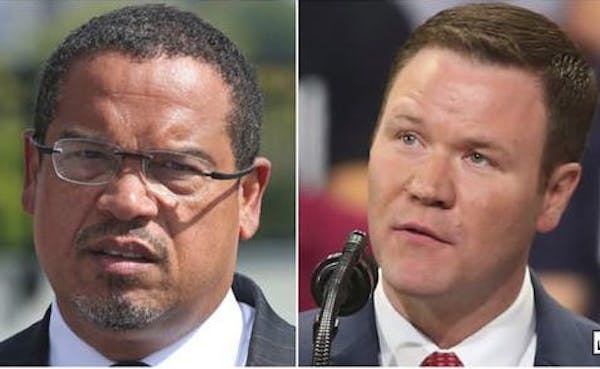Democrats Tim Walz and Keith Ellison maintained a two-to-one cash advantage over Republican opponents Jeff Johnson and Doug Wardlow in the closing weeks of the races for governor and attorney general.
Campaign finance reports released Tuesday also show a large amount of money being channeled into the battle for control of the Minnesota Legislature. Of particular concern for Johnson: The political funds of major business groups are focused on retaining Republican control of the state House — and winning a special election to retain control of the state Senate — and have largely abandoned Johnson, who has trailed in all public polls of the governor's race.
"We think [Johnson] would be a good governor. But it's fair to say our focus is on the House," said Charlie Weaver, executive director of the Minnesota Business Partnership, which, along with the Minnesota Chamber of Commerce and the Minnesota Jobs Coalition, have been working to support Republican legislative candidates.
All 134 House seats are on the November ballot; Democrats would need to flip 11 Republican seats to take over. In the Senate, the two parties are deadlocked with 33 Democrats and 33 Republicans.
A special election for a St. Cloud-area district will decide which party takes that majority.
Outside spending, largely from political committees, unions and the pro-business groups, has reached $1 million in the state Senate race and nearly $6.3 million in House races.
Former Gov. Tim Pawlenty, who was vanquished by Johnson in the Republican primary, gave $70,000 from the remaining money in his campaign account to the MN Jobs Coalition Legislative Fund, which is focused on helping Republicans retain control of the Legislature.
Another major donor to the Jobs Coalition is the Republican State Leadership Committee, which gave the Jobs Coalition $600,000 this year.
In the governor's race, Walz, who represents southern Minnesota in Congress, had $639,000 left to spend as of Oct. 22, after raising about $3.3 million this year, and receiving a public subsidy of $475,000.
Johnson had $320,000 remaining on hand, after raising $2 million and receiving a subsidy of $358,000.
The Democratic-aligned group Alliance for a Better Minnesota spent $4.1 million, most of it on attacking Johnson for his health care views in ads he says are inaccurate and unfair.
But the group also spent tens of thousands on various state House races.
The Alliance for Minnesota is backed by labor unions and wealthy individuals, including Gov. Mark Dayton's ex-wife Alida Messinger, a member of the Rockefeller family.
On the Republican side, Joan Cummins and her husband, Bob Cummins, of Primera Technology, gave more than $1.4 million to Freedom Club, a Republican-aligned group that has used much of its money to attack Walz.
In the attorney general's race, Ellison, the Democratic U.S. congressman, had nearly $335,000 left in campaign funds as of Oct. 22, more than twice what his Republican opponent Wardlow had in the bank.
Ellison raised about $825,000 in cash and got a public subsidy of about $95,000. He received donations from a long list of unions, including the Pipe Fitters, Nurses Association and Amalgamated Transit Union.
Wardlow had nearly $155,000 in cash on hand, after netting more than $714,000 in cash donations and a nearly $72,000 public subsidy.
He received far less funding than Ellison from political committees, but had a wide array of support from Republican Party units across the state, including party units representing congressional districts and county-based Republican groups.
The Wardlow campaign has been questioning the impartiality of an attorney who investigated a domestic abuse allegation against Ellison on behalf of the Minnesota DFL. She was unable to substantiate the claim, which Ellison denies.
The Wardlow campaign noted attorney Susan Ellingstad works at Lockridge Grindal Nauen, a firm that has donated to Ellison's past congressional campaigns.
Several members of the firm donated to Ellison's attorney general bid and another attorney there donated to Wardlow, the latest finance reports show. Ellingstad did not contribute to either candidate.
In the House races, the DFL Caucus had almost $1.1 million in cash left to spend. The Republican caucus had a little less than $833,000 on hand for the final stretch.
"Despite unprecedented focus and spending on Minnesota House races from Republican outside groups, our record fundraising numbers have put us in position to retake the majority and start building a Minnesota that works better for all of us," House DFL Minority Leader Melissa Hortman said in a statement.
Ben Golnik, with the Republican House Caucus, said his party isn't able to compete with the funding Democrats receive from union groups, but they are confident they have enough money to maintain the majority and win some seats now held by Democrats.
As for the Senate special election, Senate Republicans had far more cash available than Democrats — almost $1.3 million as they make the final push to elect Republican Jeff Howe.
He is facing Democrat Joe Perske in the high-stakes race. Democrats had a little more than $363,000 in their bank account to back Perske.
J. Patrick Coolican • 651-925-5042 Jessie Van Berkel • 651-925-5044
Former DFL Senate Majority Leader Kari Dziedzic dies of cancer at age 62

How the Star Tribune is covering the 2024 election

Fact check: Walz and Vance made questionable claims during only VP debate

In Tim Walz's home city, opposing groups watch him debate on the national stage

